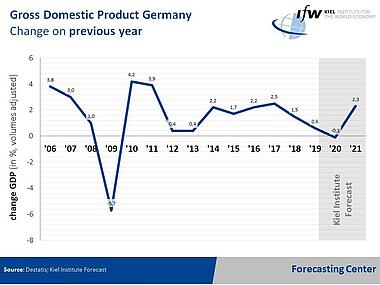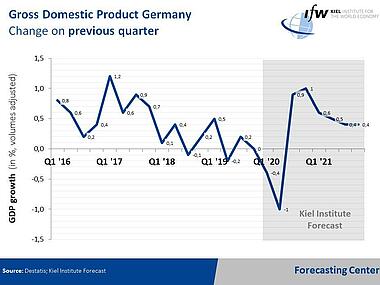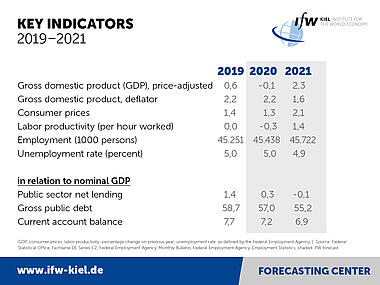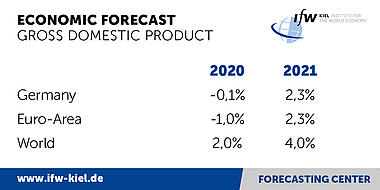News
Kiel Institute Economic Outlook: GDP expected to shrink in 2020

++++ UPDATE - This forecast was updated on 19.3.2020 You can find the update here. ++++
-----
The consequences of the corona pandemic abruptly interrupted the tentative recovery of the German economy and cost more than one percentage point in economic growth this year. Industry is sliding deeper into recession again. The domestic economy, previously the pillar of economic development, is also coming under stress. Dramatic declines in global growth have to be expected. This follows from the economic outlooks for Germany, the euro area and the global economy published today by the Kiel Institute for the World Economy (IfW Kiel).
"The concrete economic consequences of the corona virus can hardly be quantified at present. The forecast is subject to considerable uncertainty and is based on the currently most probable assumption that the pandemic will abate by the middle of the year and that there will then be noticeable economic catch-up effects. That would then be a recession in fast motion," said Stefan Kooths, Kiel Institute Head of Forecasting.
First economic slump, then counter movement
In this scenario, gross domestic product (GDP) shrinks by 0.4 percent in the first quarter and by 1 percent in the second quarter. From the third quarter onwards, a strong rebound is likely to set in and GDP in the winter will have caught up with the previous year’s level. “More working days in the final quarter will make it easier to catch up on lost production, but this is only an interim spurt,” said Kooths. While GDP will shrink by 0.1 percent this year, it is likely to grow by 2.3 percent next year.
The Kiel Institute is thus revising its previous forecast for the current year downwards by 1.2 percentage points due to the corona pandemic and upwards by 0.8 percentage points for the coming year. Due to a high number of working days, the growth rate for 2020 is overstated by 0.4 percentage points, without this calendar effect, GDP would thus shrink by as much as 0.5 percent. The high growth rates in the second half of the year lead to a statistical overhang, which in 2021 amounts to a whole percentage point of the annual growth rate.
“The main reason for the economic losses are precautionary measures as well as the high level of uncertainty about the duration and severity of the pandemic and its consequences which are hampering parts of economic life. In addition, there are declines in production because preliminary products from Asia are not delivered or are delivered too late,” said Kiel Institute President Gabriel Felbermayr.


Recession in the euro area
A recession is also likely to be unavoidable in the euro area— especially in Italy, but also on average in the monetary union. Accordingly, GDP in the euro area will shrink by 1 percent this year and increase again by just over 2 percent next year. The unemployment rate in the euro area will rise again for the time being, and the recent moderate increase in consumer prices will slow down noticeably.
Globally, the negative effects of the virus are particularly strong in Europe and Asia. Considerable economic losses are also to be expected for the emerging markets in view of the sharp drop in raw material prices. Even under optimistic assumptions about the further spread of the pandemic, the growth rate of global production in 2020 is likely to decline overall from 3 percent to 2 percent—the smallest increase since the Great Recession of 2008/2009. If the situation returns to normal quickly, production is expected to rise by 4 percent in 2021.
Kooths: "In China, production is likely to shrink significantly in the first quarter of 2020 for the first time since Mao Zedong, but a rapid recovery is expected due to the drastic crackdown by the government. At the moment it is hard to tell how badly the crisis is really hitting Italy, what difficulties it will cause for the euro area and what Corona will mean for the US economy. For the German economy there are therefore considerable downside risks beyond the scenario outlined here. But there are also upside opportunities, such as a faster than expected medical solution to control the pandemic or its health consequences."


Construction industry and labor market hardly negatively affected
For the first time since the Great Recession, German exports are likely to shrink on an annual basis by 1 percent year-on-year. "The corona effect is sending the industrial recession into prolongation, which means that investment in equipment will also stabilize later," said Kooths. Overall corporate investment is expected to fall by about 1 percent this year. The growth rate of private consumer spending is likely to be quartered to 0.4 percent compared to the previous year and the reference scenario without the corona effect, with consumer precautions in particular having an impact here, less income effects—as can be seen from the private savings ratio, which is set to rise from 10.9 percent (2019) to 11.6 percent (2020).
The construction industry, on the other hand, is unlikely to be affected, as it continues to benefit from brisk demand for housing and no major restrictions on production, for example due to a lack of materials or labor. Construction investments are likely to increase by 3.4 percent this year and 2.8 percent next year. The Kiel Institute researchers expect hardly any negative employment effects in terms of jobs. In the event of a V-shaped economic trend, even if it is severe, the vast majority of companies will be anxious to retain their staff. Unemployment is therefore likely to remain virtually unchanged at 5 percent over the entire forecast period.
The economic slump is causing the government budget balance to shrink to around 14 billion euros this year. In 2021 the balance is likely to turn into a deficit of just under 5 billion euros. But Germany continues to meet the Maastricht criterion.
Felbermayr: "With the short-time working allowance and liquidity aid for companies, the Federal Government is using the right instruments because they are targeted, timely, and temporary. Germany is well positioned overall to avoid the worst consequences, also because companies have significantly strengthened their equity base in recent years. In the event that the corona crisis lasts much longer, however, further measures should be prepared now. These include the deferral of tax payments and improved accounting rules, as well as the complete abolition of the solidarity surcharge."

